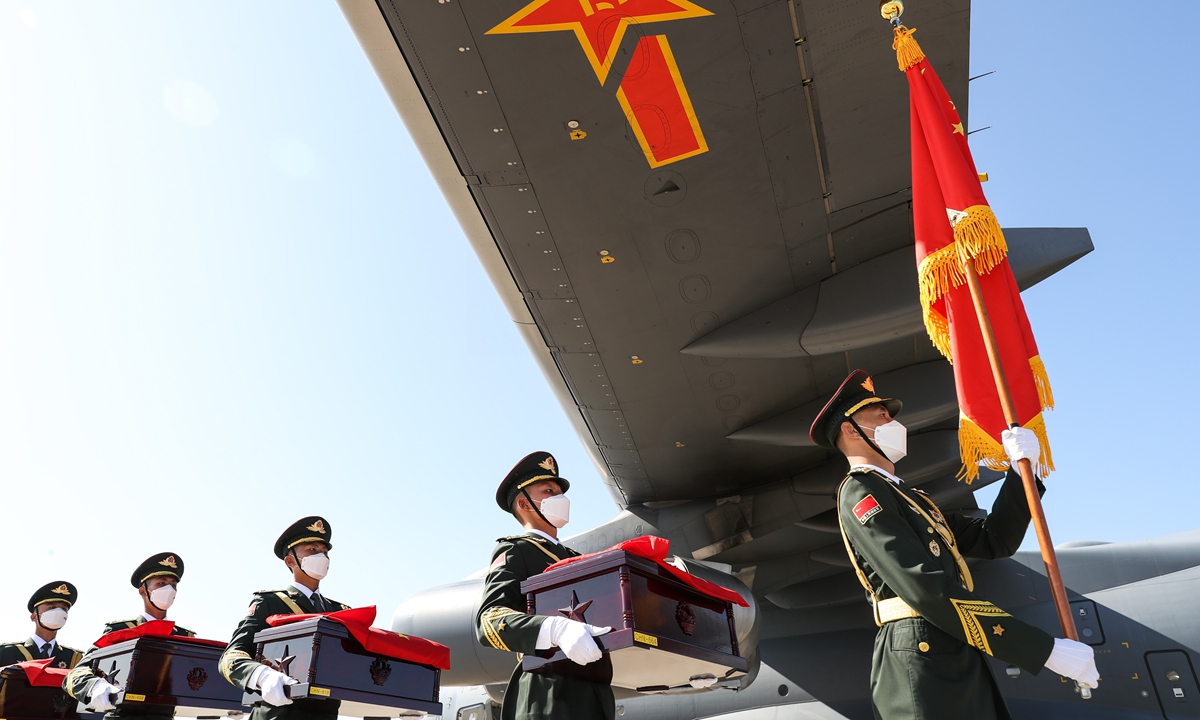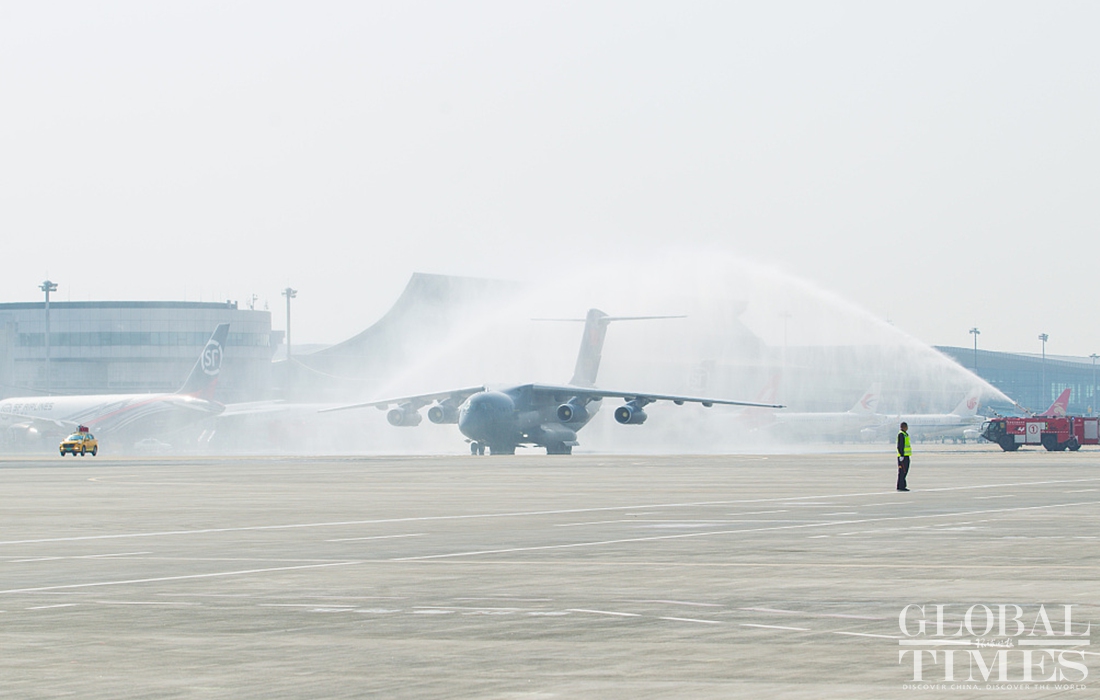Martyrs return home with state’s highest greeting ceremony
By Cao Siqi Source: Global Times Published: 2020/9/27 21:41:31 Last Updated: 2020/9/27 22:31:41
National spirit carried forward to fight hegemony till end: analysts

Chinese soldiers carry to a Y-20 plane caskets containing remains of Chinese soldiers killed in the 1950-53 Korean War during a repatriation ceremony at Incheon International Airport in Incheon, South Korea on Sunday. Photo: Xinhua

As China's domestically developed Y-20 transport aircraft landed at Shenyang Taoxian International Airport in Shenyang, NE China's Liaoning Province,two fire-fighting trucks sprayed a "water gate" to show the highest respect for the remains of 117 Chinese soldiers killed in the Korea War (1950-53). Photo: VCG
Transported via China's domestically developed strategic cargo plane Y-20, which was greeted by arcing jets of water as it taxied to a halt at Taoxian international airport in Shenyang, capital of Northeast China's Liaoning Province, the remains of 117 Chinese soldiers killed in the War to Resist US Aggression and Aid Korea (1950-53) returned home on Sunday, reflecting the country's unprecedented respect for its martyrs.
The highest greeting ceremony, coming amid the 70th anniversary of commemorating the spirit of the war, is believed to send a strong message to the world at a time when the international community is undergoing profound changes unseen in a century. With the COVID-19 pandemic, in particular, shaking the international strategic landscape, if certain countries, especially the US, still insist on hegemonic logic and dragging China into the new cold war, China will fight back unswervingly.
More importantly, nobody nor any country should ever underestimate China's determination to safeguard every inch of its territory. China is no longer the poor, underdeveloped country that it was decades ago. The Chinese people, inheritors of the heroic national spirit forged in the flames of wars, oppose war, but are never afraid of war, Chinese analysts said.
Highest greeting ceremony
Escorted by two Chinese fighter jets, the Y-20 transport plane carrying the remains and belongings of the fallen soldiers landed at the Shenyang airport at 11:18 am.
This is the first time China has sent a Y-20 to repatriate the remains of Chinese People's Volunteers' (CPV) Army martyrs, China Central Television reported on Sunday, noting that the serial number "01" on the aircraft is an indication of the highest respect to the martyrs. Previously, the remains of Chinese soldiers killed in the war were transported on Russian-made Ilyushin-76.
It is the seventh such repatriation following a handover agreement signed by China and South Korea. The remains were casketed in South Korea on Saturday at a ceremony held at a provisional morgue of the 17th army division of the South Korea in Incheon, west of the capital Seoul.
The remains will be buried in a martyrs' cemetery in Shenyang, with a ceremony due to be held Monday. The remains of 599 soldiers previously sent back from South Korea had been buried there between 2014 and 2019.
The personal seals of three martyrs - Ma Shixian, Lin Shuishi and Ding Zuxi - were found in the belongings, providing clues for confirming the identities of the heroes and finding living relatives.
On Saturday night, officials from the Veterans Affairs Bureau in Zhangpu county, East China's Fujian Province found Lin's relatives. "Thanks to the Party and the government for not forgetting the martyrs," Lin Shuxin, the grandnephew of Lin Shushi, told CCTV.
With great excitement, Yin Jixian, a 90-year-old veteran who fought in the war, told the Global Times on Sunday that "our motherland will never forget them. The days of being invaded and captured will no longer come back. China is becoming strong and powerful."
"During the war, I was almost killed in South Korea like these martyrs. Their contribution made China a world economic and military power without big wars for 70 years. The grand ceremony proves that people will always remember those who have sacrificed for the peace and safety of the country," Yin said, in a choked voice.
Fight till the end
This year marks the 70th anniversary of the CPV's participation in the Korean War (1950-53). This part of China's active participation is generally called the War to Resist US Aggression and Aid Korea in China.
Seventy years ago in1950, when the US army invaded Korea, bringing the flames of war to China's northeastern border and making an attempt to occupy China's territory Taiwan, China made the historical decision to resist the US and assist Korea in protecting the neighboring country.
On October 19, 1950, at the request of North Korean government, the CPV crossed the Yalu River, the border between China and North Korea, to battle the US-led "UN forces" in North Korea. Chinese forces drove the US back to the 38th Parallel at the cost of at least 190,000 Chinese lives. The two years and nine months of bloody fighting shattered the US imperialist myth of invincibility.
"Faced with the extremely difficult and complex situation and the disparity between the strengths of the enemy and ourselves, China's top leaders made the timely and decisive decision with great political and strategic courage. At present, in the face of more complex and severe international situations, there is an urgent need for the Chinese people to carry forward the spirit and enhance our determination to fight against strong enemies," Lieutenant General He Lei, former vice president of the Academy of Military Sciences of the People's Liberation Army, wrote in a contribution to the Global Times on Sunday.
The smoke of the war has long since dissipated, but the root causes of modern wars have not been eliminated. The world today is not peaceful with hegemonism and power politics still existing, He said, stressing that "we must recognize the situation clearly, throw away our illusions, be alert to potential risks, and enhance the awareness of being ready to fight."
Yang Xiyu, a senior research fellow at the China Institute of International Studies in Beijing, said on Sunday the grand ceremony signals that ties between China and South Korea are progressing and are seeing new achievements.
"The Korean War is an outcome of the Cold War mentality. Before being involved in the Korean War, the US led military attacks that approached China, and China issued warnings to the US several times to halt the war. However, decision-makers of the US underestimated China's determination and refused to listen to the warnings, which forced China to fight. Under such circumstances, China's action shows that the country has always respected peace, but also values international justice," Yang noted.
Now, the highest ceremony is not only intended to unite the nation and promote the national spirit, but is also telling the world that China will firmly fight against any threats or harm to the country's interests, without any hesitation, Yang said.
In July, China announced that it will issue commemorative medals on the 70th anniversary of the CPV Army's participation in the war. On September 19, a Memorial Hall of the War to Resist US Aggression and Aid Korea in the border city of Dandong, Liaoning, reopened after a six-year renovation. Several Chinese-made films and TV productions about the war are reportedly underway.
Some media reports claimed that China is commemorating the spirit of the war in such a high profile because China and the US ties are in a downward spiral to the lowest point since the establishment of diplomatic ties in 1979.
Analysts pointed out that such speculation is superficial as inheriting and carrying forward the national spirit is the historical responsibility of the Communist Party of China and it does not target any country.
"The US is important to China, but not that important. China's diplomatic principles have always been built on its own stances," Yang said.